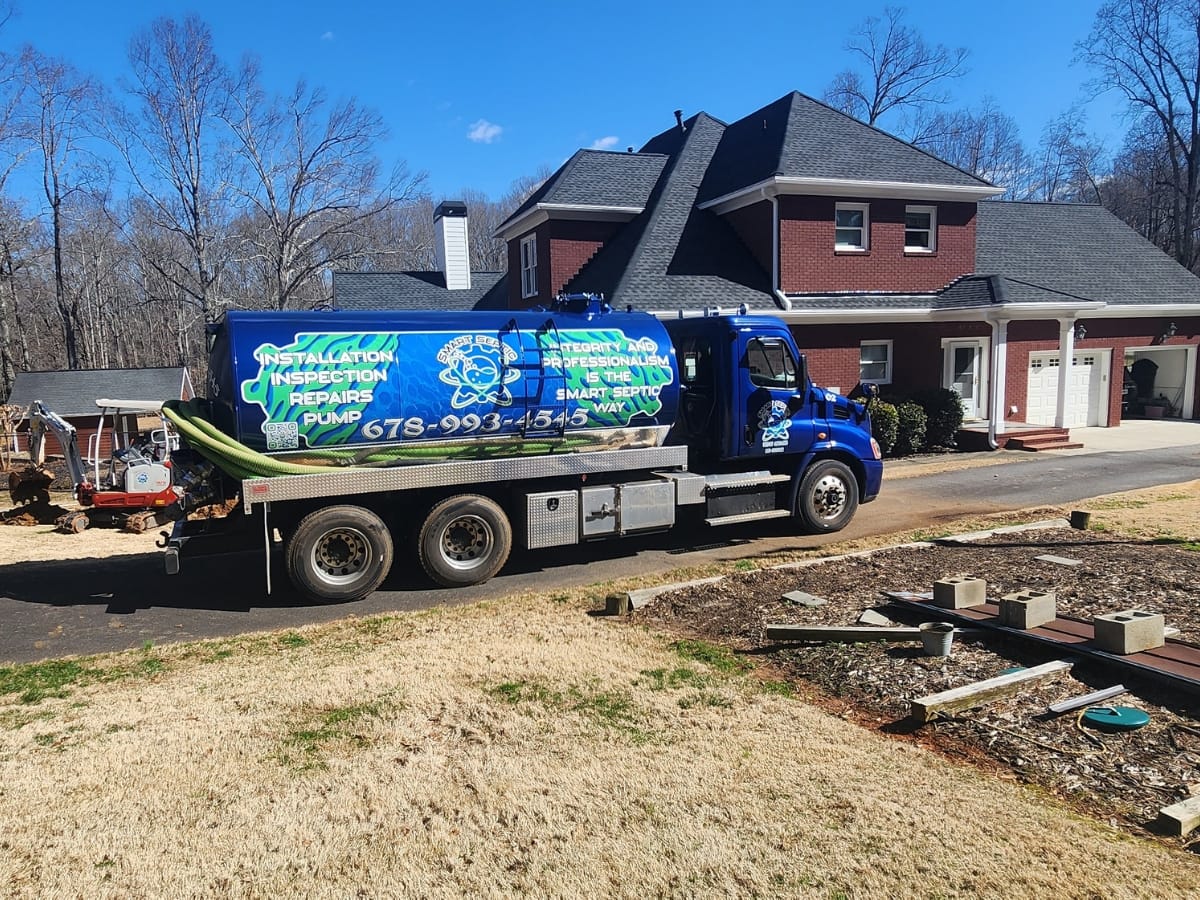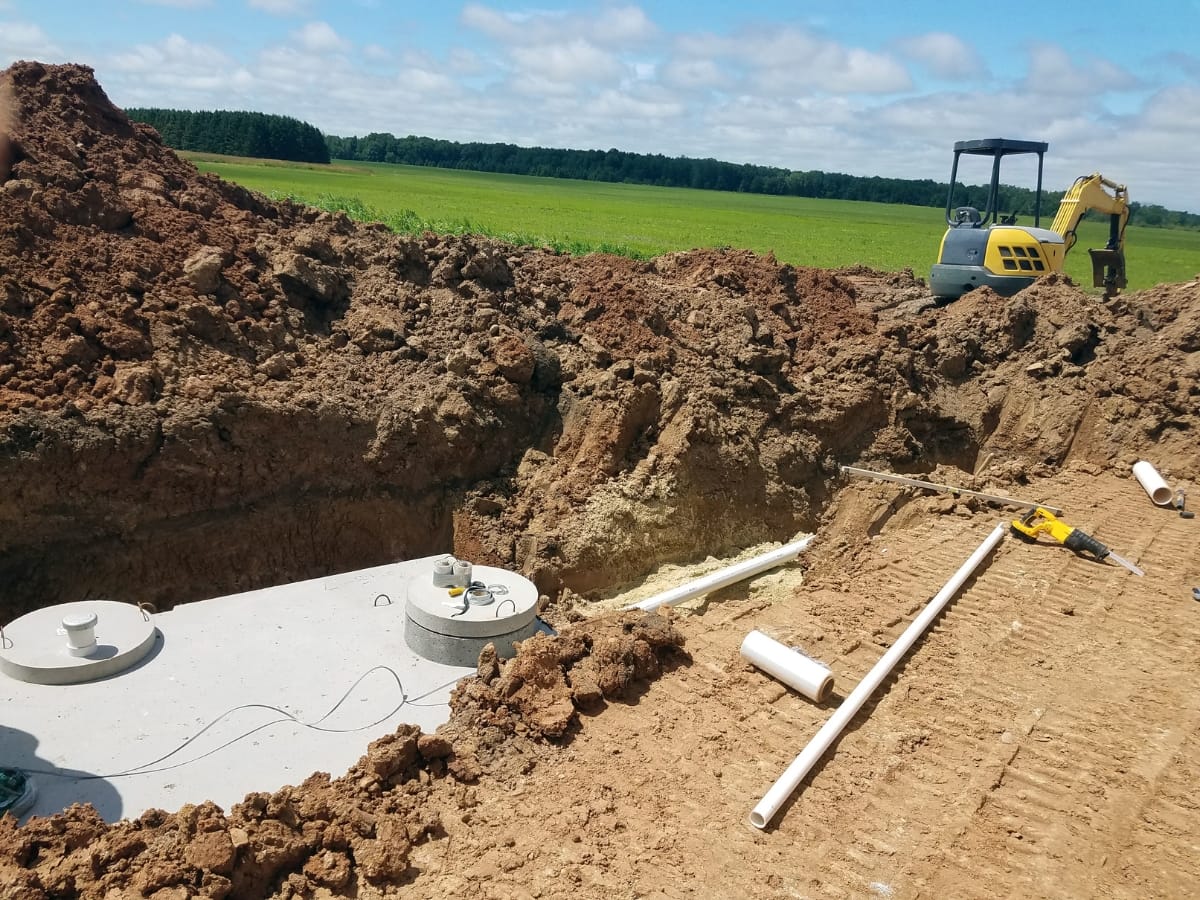When a septic emergency strikes your Marietta home—whether it’s a foul odor, soggy yard, or worse, sewage backing into your drains—quick and professional intervention isn’t just a matter of convenience; it’s essential for protecting your family’s health, your property, and the local environment. Ignoring these warning signs or attempting a DIY fix can lead to costly damage, groundwater contamination, and even legal liabilities. In this guide, we’ll outline the critical signs that demand immediate expert attention, what to expect from emergency septic services Marietta, and why acting fast with a trusted pro can mean the difference between a manageable repair and a catastrophic—and expensive—cleanup.
Emergency Septic Services Marietta: Fast Relief When It Counts
What Are The Urgent Signs Of A Septic Emergency In Marietta?
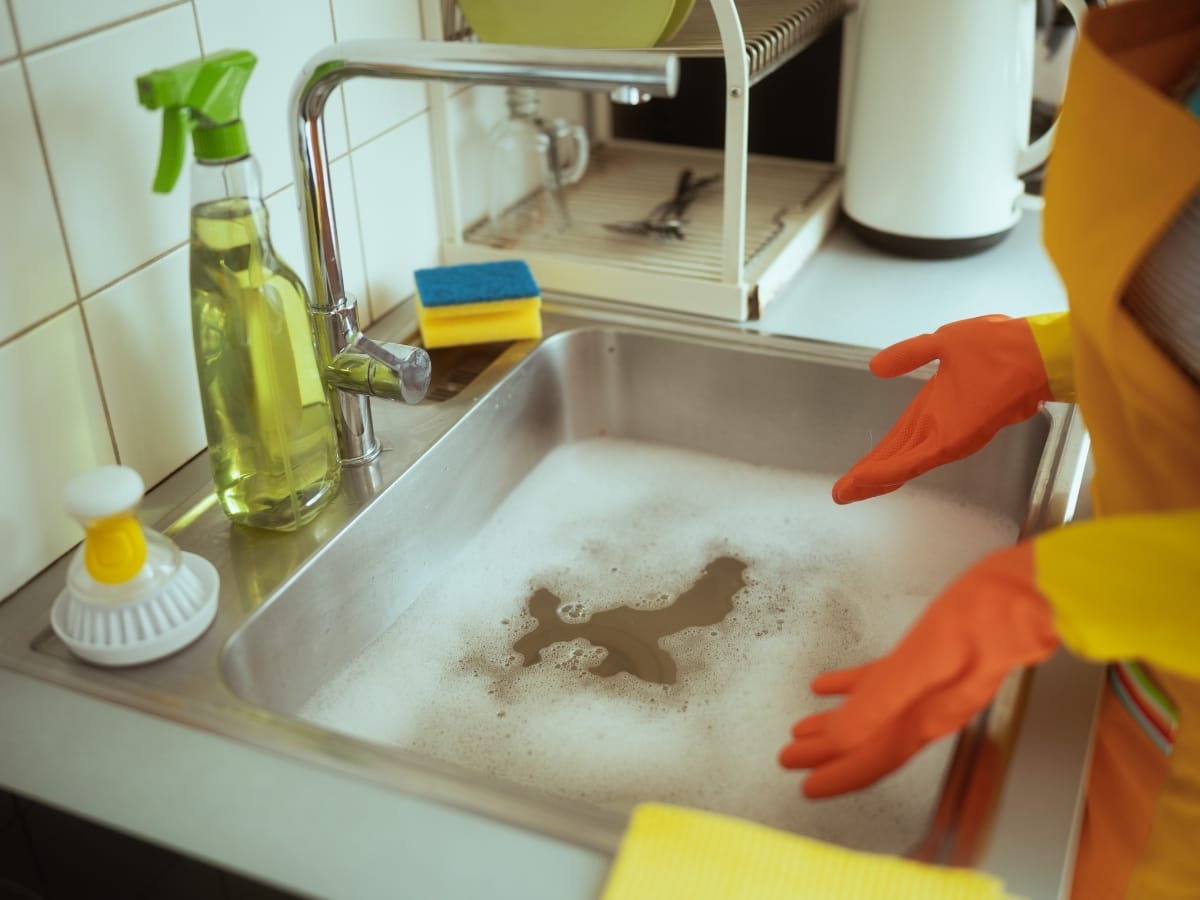
Septic problems rarely fix themselves. When a tank or drain field is failing, the warning signs tend to show up fast and in more than one place. Spotting them early helps protect your home, your yard, and your health. If you notice any of the symptoms below, schedule an inspection right away. For quick help, search for emergency septic services Marietta to find a licensed local provider.
How Do Slow Drains And Sewage Backups Indicate Septic Failure?
Drains that once cleared quickly but now linger or gurgle are more than a nuisance. They often point to a blockage at the tank’s inlet or outlet baffle, a crushed or clogged line, or a drain field that is saturated and no longer accepting effluent. When the system cannot move wastewater, it will force its way back through the lowest fixtures first, such as tub drains, basement floor drains, or first-floor toilets. Any sign of sewage backing up indoors is an immediate health risk. Stop water use, avoid flushing, and have a professional assess the system before using plumbing again.
What Does A Foul Odor Around Your Property Mean For Your Septic System?
A strong sewage smell near bathrooms, the tank lid, or the drain field is a red flag. Odors can escape when the tank is overloaded, the venting is compromised, or the tank or riser has cracked. In each case, untreated wastewater or gases are escaping rather than staying contained and properly processed. Besides being unpleasant, this can point to leaks that allow contaminants to reach soil and groundwater. Do not attempt to open the tank to investigate. Keep people and pets away from the area and arrange for an urgent evaluation.
Why Is Pooling Water Or Lush Green Grass A Warning Sign?
Standing water over the drain field, spongy soil, or unusually bright green grass strips often signal that the soil is saturated with effluent. When the drain field cannot absorb more water, it pushes to the surface, leaving wet spots even in dry weather. This condition may be caused by heavy water use, a clogged biomat, compacted soil, or root intrusion. Continued use under these conditions can lead to erosion, sinkholes, or contaminated runoff. Reduce water use immediately and have the field inspected to determine whether pumping, jetting, or repair is required.
How Do Gurgling Sounds And Septic Alarms Signal An Emergency?
Persistent gurgling after flushing or when sinks drain usually means air is fighting past water in restricted pipes. In systems with pumps, a high-water alarm or control box alert indicates the water level has risen beyond safe limits, often due to pump failure, float switch problems, or downstream blockage. Silence the alarm if recommended by the manufacturer, limit water use, and request service. Alarms are designed to give you time to act before a full backup occurs.
What Should You Do First When You See These Signs?
Limit water use. Pause laundry and dishwasher cycles and shorten showers to reduce the load on the system. If sewage has entered living spaces, avoid contact and ventilate the area. Do not use chemical drain cleaners, which can harm septic biology and make matters worse. Document what you see and when it started. Then contact a licensed septic professional for same-day service. A prompt response can often keep a repair from turning into a full system replacement.
The Bottom Line For Marietta Homeowners
Slow drains, sewage odors, pooling water, gurgling pipes, and alarm alerts are not minor issues. They are clear signals that your system needs immediate attention. Acting quickly protects your home and yard, reduces cleanup costs, and helps your septic system return to safe operation.
What Common Causes Lead To Emergency Septic Issues In Marietta, GA?

Most septic emergencies start with a few overlooked problems that build over time. Tanks that are not pumped on schedule, drain fields that are overloaded with water, and lines damaged by roots or traffic all reduce a system’s ability to treat and move wastewater. In a city like Marietta, heavy rains and clay soils can make matters worse by slowing soil absorption. Knowing the triggers helps you avoid frantic searches for emergency septic services Marietta when a backup hits.
How Do Maintenance Gaps Trigger Sudden Failures?
Septic tanks separate solids from liquids. When pumping is skipped, sludge and scum layers rise until they block the outlet baffle or spill into the drain field. The field then clogs and loses capacity, which sends wastewater back toward the house. A simple pumping plan every three to five years, paired with quick repairs to worn baffles or risers, keeps solids where they belong and protects the soil around your field.
Why Does Water Volume Matter So Much?
Septic systems need time for separation and treatment. Long showers, back-to-back laundry loads, and running multiple fixtures at once flood the tank. Excess volume pushes partially treated water into the field and shortens the time solids have to settle. Fixing leaky toilets and faucets, spacing out laundry days, and installing low-flow fixtures reduce hydraulic load so your system can keep up during peak use and rainy weeks.
What Physical Damage Puts Your System At Risk?
Drain fields and laterals are vulnerable to pressure and intrusion. Parking vehicles on the field compacts soil and crushes lines. Tree and shrub roots seek moisture and can invade joints, creating blockages that are hard to see until the system backs up. Even landscaping projects can pinch pipes if depths are misjudged. Keep vehicles off the field, plant deep-rooted trees well away from the system, and call for a locate before digging.
Which Household Habits Lead To Blockages?
Grease, wipes, and non-biodegradable items do not break down in a tank. They settle into a heavy layer that clogs tees, pumps, and laterals. Harsh chemical drain cleaners can also harm the bacteria that digest waste, slowing treatment. A simple rule protects your system: only flush human waste and toilet paper, scrape grease into the trash, and rely on enzyme-friendly products for routine cleaning.
Quick Reference: Frequent Causes And Practical Fixes
| Cause | Impact | Practical Prevention |
|---|---|---|
| Skipped pumping | Sludge clogs baffles and laterals | Pump every 3 to 5 years and inspect baffles |
| Excess water use | Field overload and surface pooling | Stagger laundry, fix leaks, add low-flow fixtures |
| Pipe or field damage | Crushed or blocked lines | Keep vehicles off field, verify utility depths before digging |
| Improper disposal | Wipes, grease, and solids cause blockages | Flush toilet paper only, keep grease out of drains |
| Root intrusion | Roots invade joints and tees | Maintain clear planting zones and install root barriers |
| Poor installation or grading | Standing water over field | Correct slope and redirect roof and sump discharge |
How Can Marietta Homeowners Prevent Emergencies?
Direct roof gutters and sump discharge away from the drain field so rain does not saturate the soil. Add effluent filters at the outlet tee to catch stray solids, and clean the filter during routine service. If you host guests or expect heavy water use, plan short-term pumping or adjust habits to prevent a surge. Keep records of tank size, pumping dates, and any repairs so trends are easy to spot. Finally, schedule a full system check if you hear gurgling, notice slow drains across the home, or see damp patches over the field. Acting on early signs is the best way to avoid a costly overflow.ibute to emergency situations. Being aware of them empowers you to take proactive steps and avoid urgent repairs.
What Emergency Septic Services Does Smart Septic Pros Offer in Marietta?
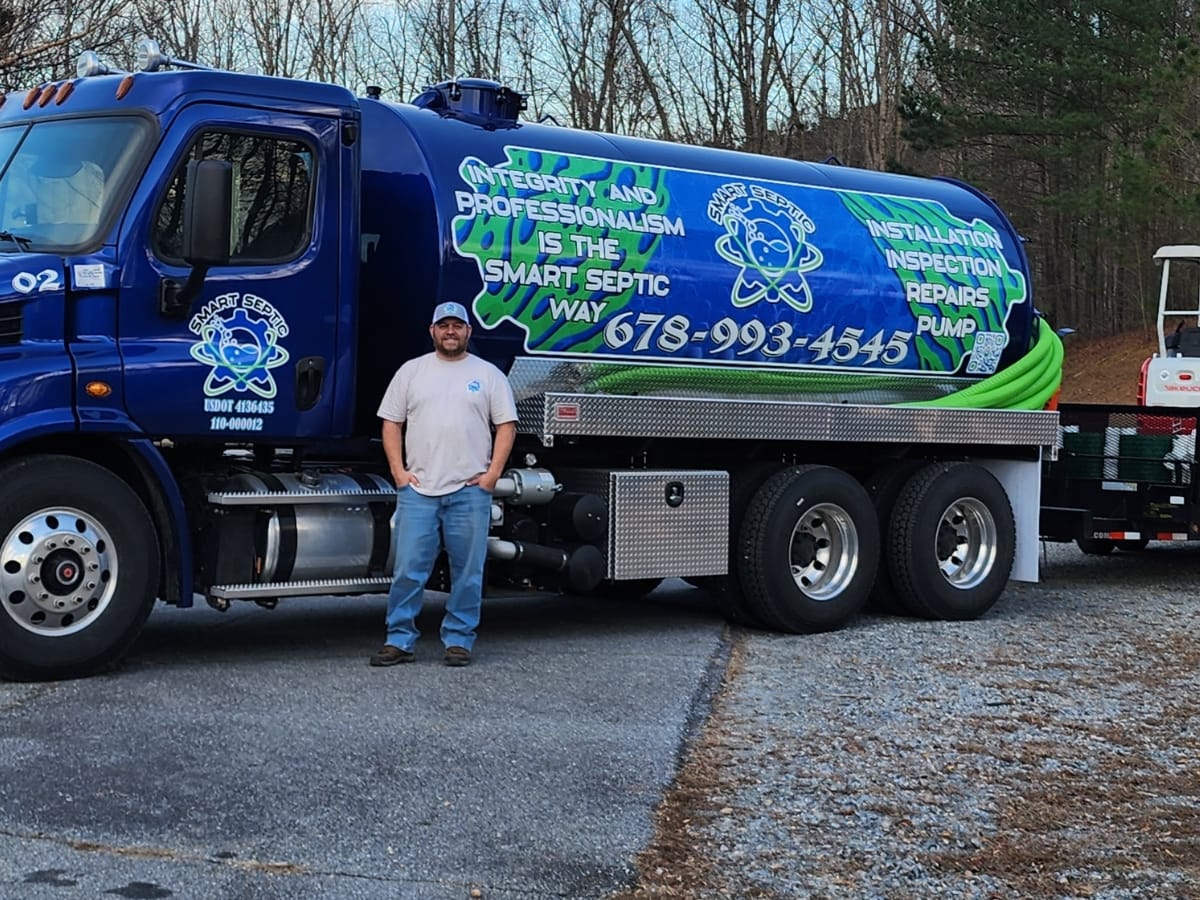
Smart Septic Pros handles urgent septic problems from the first call through final cleanup. The team focuses on fast diagnostics, safe containment, and reliable repairs so backups, leaks, and alarms are brought under control quickly. If you are searching for emergency septic services Marietta, the goal is simple: restore flow, protect your property, and reduce the chance of a repeat failure.
How Does 24/7 Rapid Response Ensure Immediate Septic Repair?
Septic issues do not wait for business hours, so technicians are dispatched day and night to assess the system, isolate the fault, and stabilize conditions. A rapid on-site evaluation pinpoints whether the cause is a clog, a failed pump, a broken baffle, or a saturated drain field. Acting fast limits exposure to wastewater, protects indoor finishes, and keeps a minor outage from becoming a larger cleanup.
When Is Emergency Septic Tank Pumping Necessary To Prevent Overflow?
Emergency pumping is the right move when the tank is near capacity, effluent is surfacing around lids or piping, or multiple fixtures are backing up at once. A high-level alarm is another clear signal. Pumping lowers liquid levels, clears the inlet and outlet, and buys time for a thorough inspection of baffles, tees, and filters. In heavy rain or high-use periods, this step prevents the field from being pushed past its ability to absorb water.
What Urgent Repairs Address Septic Leaks And Backups?
After the tank is stabilized, technicians repair the specific failure causing the incident. Common fixes include reseating or replacing cracked lids, installing new inlet or outlet baffles, and correcting collapsed or root-bound lines between the house, tank, and distribution box. Each repair is verified with a flow test so wastewater moves freely through the system before the crew leaves the site.
How Are Drain Field Failures Handled In Emergencies?
Field failures show up as pooling water, bright green strips of grass, or slow drains across the entire home. In an emergency, the priority is to relieve hydraulic pressure and protect the soil. Crews identify saturated zones, restore distribution, and replace compromised laterals where needed. Grading and redirection of roof runoff or sump discharge help keep excess water off the field so it can recover and function as designed.
When Is Septic System Replacement The Right Call?
Some systems are at the end of their service life or have damage that makes repeated repairs impractical. Replacement is often recommended when structural problems with the tank or extensive drain field failure would cost more to fix than a new installation, or when the system is well beyond its expected lifespan. A full replacement includes a site evaluation, sizing to current household use, and a layout that meets local code so the new system performs reliably for years.
How Do You Reduce The Chances Of Another Emergency?
Once the immediate crisis is resolved, a short maintenance plan keeps things stable. Pump on schedule, clean effluent filters, space out high-volume water use, and keep grease, wipes, and harsh chemicals out of drains. Protect the field from vehicles and deep-rooted plantings, and direct roof runoff away from the area. These simple habits support the repairs and help the system handle everyday demands without surprise breakdowns.
Why Choose Smart Septic Pros For Emergency Septic Repair In Marietta, GA?
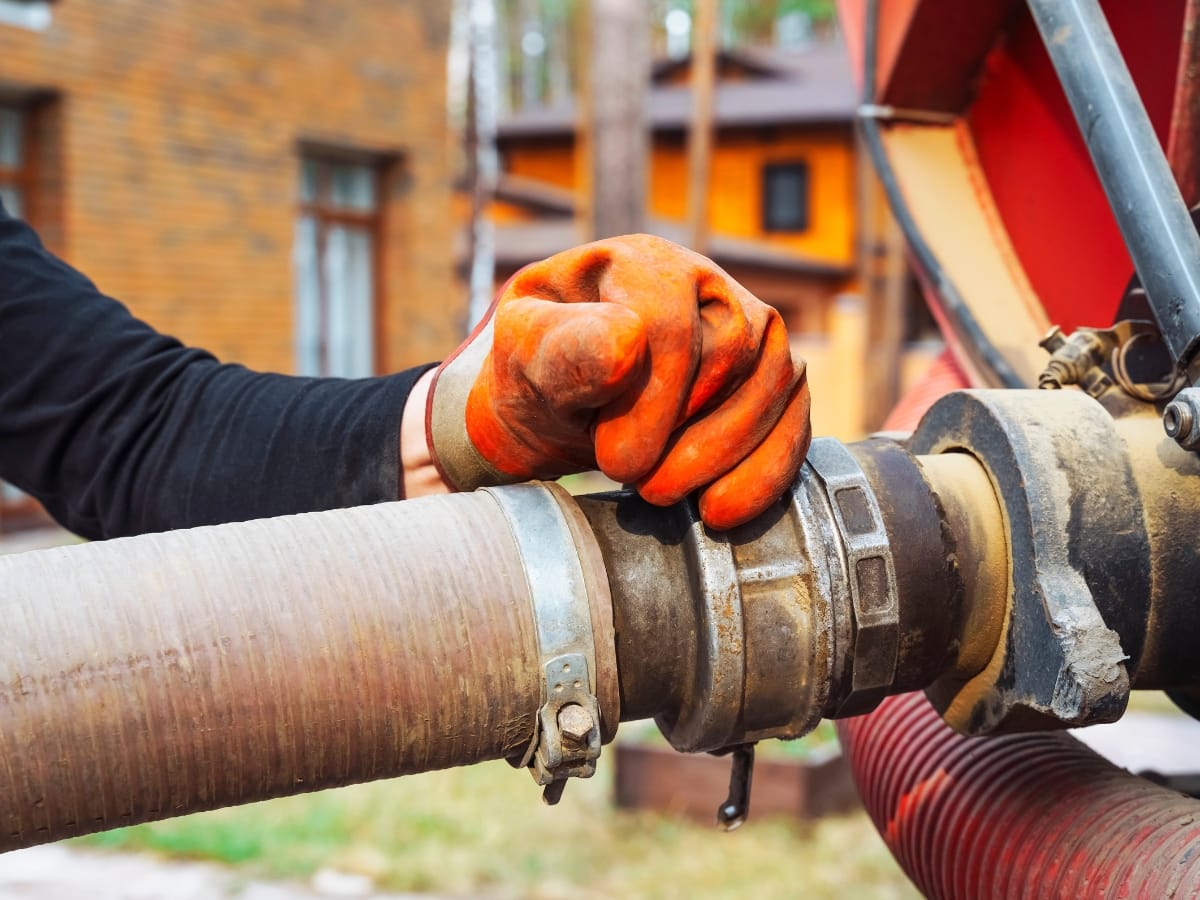
When a septic failure disrupts your home or business, you need fast help from people who understand local conditions. Smart Septic Pros pairs quick response with practical expertise so your system is stabilized, repaired, and put back into reliable service. If you are searching for emergency septic services Marietta, the value comes from clear communication, code-compliant fixes, and work that prevents repeat problems.
How Does Local Expertise Benefit Marietta Residents In Septic Emergencies?
Cobb County soils range from red clay to sandy loam, and rainfall patterns can saturate a drain field with little warning. A team that works in these conditions every day can read the signs quickly, confirm whether the field is overloaded or a tank component has failed, and recommend solutions that match the site. Familiarity with county permitting and inspection routines also shortens timelines, which matters when fixtures are backing up and outdoor areas are at risk.
What Certifications And Experience Do The Technicians Have?
Every lead technician holds a state installer license and current OSHA safety training. Crews have hands-on experience with residential tanks, advanced treatment units, lift stations, and commercial grease-bearing lines. That background shows up in the details: setting proper tank elevations, restoring damaged baffles, rebuilding distribution boxes, and verifying flow with a functional test before leaving the property. The result is a repair that meets code and stands up to real-world use.
How Transparent Are Pricing And Financing Options During An Emergency?
Stress is higher when you do not know what a repair will cost. Smart Septic Pros provides a written scope and estimate after the initial inspection so you understand labor, pumping, parts, and any soil work that may be needed. If the job is larger than expected, you get options that fit different budgets. Flexible payment arrangements are available for qualified homeowners, which helps you resolve urgent issues without delaying essential work.
How Do Technicians Prioritize Safety And Property Protection?
Septic work involves confined spaces, heavy equipment, and wastewater handling. Crews use protective gear, isolate work zones, and contain effluent to prevent contamination. Surfaces are sanitized where needed, and landscaping is protected as much as site conditions allow. Indoors, technicians take steps to shield flooring and fixtures while clearing backups. The goal is to correct the fault and leave the space clean and functional.
What Should You Expect During An Emergency Visit?
First, a rapid on-site assessment confirms the source of the failure. If levels are high, emergency pumping lowers the liquid and prevents overflow. The technician then inspects inlet and outlet fittings, filters, and the distribution path to the field. If a pipe is collapsed or root-bound, it is cleared or replaced. If the field is saturated, temporary flow reduction and runoff controls protect the soil while longer-term remedies are planned. Before departure, the system is flow-tested and you receive maintenance steps tailored to your site.
When Is Replacement More Practical Than Repair?
Some tanks and fields are at the end of their service life or have structural damage that makes repeated repairs poor value. Replacement becomes the smart move when the cost of fixes approaches the price of a new system, or when capacity no longer fits current household use. In those cases, Smart Septic Pros designs a code-compliant layout sized to the site and manages the install so you have dependable service for years.
How Can You Reduce The Risk Of Future Emergencies?
Simple habits make a big difference: schedule pumping on time, spread out high-volume water use, clean effluent filters, and keep wipes, grease, and harsh chemicals out of drains. Protect the drain field from vehicles and redirect roof runoff away from the area. With a sound repair and these practices in place, your system can handle everyday demand without surprise breakdowns.
How Can You Prevent Future Septic Emergencies With Proactive Maintenance?
Preventative care is the simplest way to avoid sudden backups, foul odors, and drain field failures. A consistent plan keeps sludge levels under control, protects piping, and preserves soil absorption so the system can handle daily demand. For homeowners searching for emergency septic services Marietta, the best first step is often a strong maintenance routine that reduces the chance of needing urgent help in the first place.
Why Are Regular Septic Inspections Essential For Emergency Prevention?
Inspections reveal small problems before they turn into costly repairs. A trained technician checks liquid levels, looks for seepage around the tank, confirms that inlet and outlet baffles are intact, and verifies that effluent filters are clean. They also scan for tree roots that can intrude on pipes, and they assess whether traffic, landscaping, or drainage changes are putting stress on the field. Scheduling a professional inspection every one to three years gives you a clear snapshot of system health, documents compliance with local guidelines, and builds a history that helps predict future needs.
How Often Should You Schedule Septic Tank Pumping In Marietta?
Most households do well with pumping every three to five years, but actual timing depends on tank size, number of occupants, water use, and garbage disposal habits. A two-person household in a modest home may go longer between pumps, while a large family or frequent guests can fill a tank more quickly. The goal is to remove accumulated sludge and scum before they reach the outlet, since carryover into the drain field can clog soil and shorten its life. If you are unsure about timing, ask for a sludge and scum measurement during your next inspection so the pumping schedule reflects your real conditions.
What Water Usage And Waste Disposal Practices Protect Your Septic System?
Small changes in daily habits can dramatically reduce stress on the tank and field. Spread laundry loads across the week so the system is not flooded on a single day. Fix leaking faucets and running toilets quickly, since constant trickle adds up to hundreds of gallons over a month. In the kitchen, cool and can solidify grease before disposal in the trash. In bathrooms, limit what goes down the drain to human waste and toilet paper. Avoid wipes, feminine products, cotton swabs, and disinfecting chemicals that can disrupt beneficial bacteria. Choose low-phosphate, septic-safe cleaners and detergents, and use them in measured amounts instead of heavy pours.
How Do Landscaping And Drainage Choices Affect Septic Reliability?
Your yard has a direct influence on system performance. Keep heavy vehicles and equipment away from the tank and field to prevent pipe collapse and soil compaction. Divert roof gutters and hardscape runoff so stormwater does not saturate the drain field. Select shallow-rooted plants for the field area and keep thirsty trees at a safe distance. If you plan new patios, driveways, or additions, map their location against the septic layout to preserve access for maintenance and avoid covering lids or cleanouts.
What Simple Monitoring Habits Help You Catch Issues Early?
Pay attention to how your drains sound and smell. Slow fixtures throughout the home, gurgling at multiple locations, or wet spots near the tank or field signal that it is time for a check. Keep a basic log of pump dates, inspection notes, and any repairs. This record helps a technician connect the dots quickly during a service call and can lower the total cost of diagnosing a problem.
With scheduled inspections, timely pumping, smart water use, and thoughtful yard planning, most septic systems run quietly for years. A little diligence now reduces the risk of emergencies and keeps your home safe, sanitary, and ready for daily life.
What Are The Local Regulations And Compliance Requirements For Septic Emergencies In Marietta, GA?

Emergency work on a septic system still has to meet city and county rules. Marietta and Cobb County expect repairs to protect public health, keep groundwater clean, and restore safe operation as quickly as possible. That means documenting what failed, fixing it with approved methods, and ensuring the tank, lines, and soil treatment area are left in a stable condition. When you plan for emergency septic services Marietta, it helps to know that inspections and recordkeeping are part of the process, even when the situation is urgent.
How Do Marietta And Cobb County Septic Permitting Rules Affect Repairs?
Cobb County typically requires permits for opening a tank, replacing baffles, installing new piping, or altering a drain field. In true emergencies that threaten a home or the environment, the county may allow expedited reviews so work can begin sooner, but the job still needs to be permitted and inspected. Homeowners should be prepared to provide site access, system location information, and any previous service records so the permitting path is faster and clearer.
Why Is Hiring Licensed Professionals Critical For Emergency Septic Services?
Licensed contractors can pull the correct permits, follow soil-saturation rules, and submit the compliance reports the county expects after emergency work. They also know how to diagnose the root cause instead of only clearing a symptom, which reduces the chance of repeat failures. Proper containment, transport, and disposal of waste are legal requirements, and professionals have the training and equipment to handle them safely.
How Much Does Emergency Septic Service Cost In Marietta, GA?
Pricing depends on the issue, the components involved, and site conditions. Simple emergency pumping to relieve a near-overflow typically costs less than structural repairs to tanks or distribution lines. If excavation is needed, plan for additional labor and equipment costs. After-hours response can add a premium, but it often prevents water damage, interior cleanup, and extended system downtime, which can be more expensive.
What Factors Influence The Price Of Emergency Septic Repairs And Pumping?
Tank size and depth affect crew time and the type of equipment required. Accessibility matters, since buried lids under concrete or heavy landscaping increase labor. The extent of damage drives cost as well, because replacing cracked lids or failed baffles is more involved than clearing a blockage. Soil conditions can raise or lower pricing; clay-heavy or saturated sites are harder to excavate and backfill, while a dry, open yard is faster to work in. If cameras, jetting, or temporary bypass lines are needed to stabilize the system, those add to the total but can prevent larger failures.
What Financing Options Are Available For Urgent Septic Repairs?
When a repair cannot wait, homeowners often combine short-term financing with any available utility or county assistance programs. Personal loans, home equity lines, and contractor-arranged payment plans are common tools for spreading the cost over time. Before you choose, ask for a written scope of work, a clear price range that covers both parts and labor, and an outline of what happens if additional issues are found once the tank is opened. Transparent documentation makes it easier to compare offers and choose terms that fit your budget.
How Can Homeowners Streamline Compliance During An Emergency?
Keep a simple file with your system map, past pumping dates, inspection reports, and contact information for your installer or service provider. Mark tank and cleanout locations so crews can access them without delays. If you notice early warning signs such as persistent slow drains, odors near the tank, or wet areas over the field, schedule an inspection rather than waiting for a backup. A few organized steps can shorten response times, reduce total cost, and help your household return to normal more quickly.al experts to keep your septic system running smoothly and protect your property from health hazards.
Conclusion
When septic emergencies strike—from backups to foul odors—swift action is critical to prevent property damage and health hazards. At Smart Septic Pros, we offer 24/7 emergency services for Marietta homeowners, combining rapid response times with expert septic solutions to restore your system’s function and your peace of mind. Don’t risk DIY fixes: Call 678-993-4545 or use our contact form now for immediate assistance. Trust our licensed team to handle emergencies efficiently, so you can focus on what matters most.

